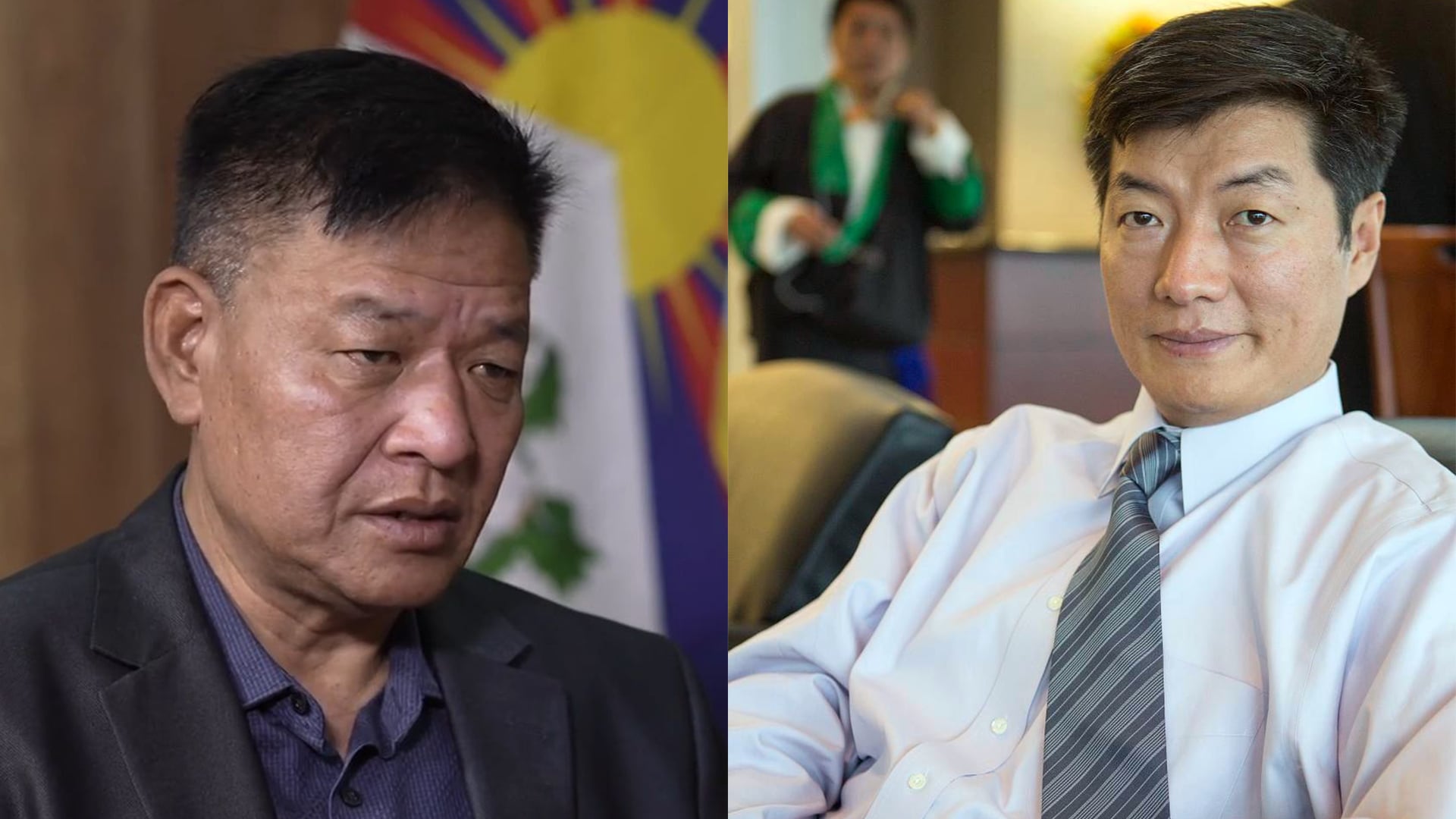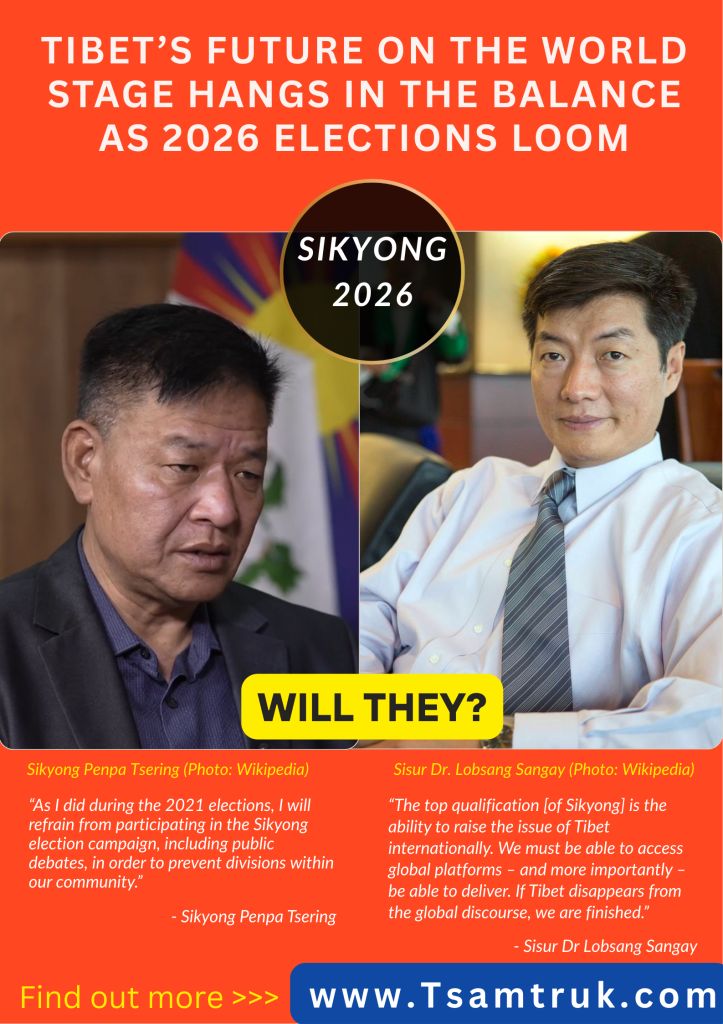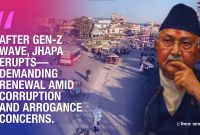Tibet's Future on the Line: Will This Election Bring Hope or Silence?

Tsering Passang
As the Central Tibetan Administration (CTA) – Tibet’s government-in-exile – prepares for its 2026 general elections, a renewed wave of political energy is rising across the Tibetan diaspora. Yet this momentum is accompanied by deepening anxiety: Tibet’s voice is fading from global discourse just as international attention fractures and authoritarianism gains ground. This article highlights two prominent figures central to this pivotal moment.
One is the incumbent Sikyong, Penpa Tsering, who remains active in diplomatic efforts across India, North America, and Europe. The other is Dr. Lobsang Sangay, former Sikyong (2011–2021), who continues to engage global audiences on high-profile platforms – most recently at LibertyCon Europe in the Czech Republic. Their contrasting leadership styles are sparking critical debates about the future direction of the Tibetan freedom movement.
At LibertyCon Europe – one of the continent’s largest gatherings of pro-liberty students, youth activists, and human rights defenders – Dr. Lobsang Sangay warned that China’s authoritarianism is no longer just a regional issue but a direct threat to the liberal international order. Reflecting on his decade of leadership, he framed the repression in Tibet, East Turkestan, Southern Mongolia, and mainland China as part of a broader ideological conflict.

His message extended beyond global policymakers. It was a direct appeal to young Tibetans raised in exile – many of whom remain deeply connected to their heritage despite being born far from occupied Tibet. Speaking in Paris, home to one of Europe’s largest Tibetan communities, the former Tibetan leader urged youth to take an active role in civic and political life.
These appeals come amid a worrying decline in Tibet’s global visibility. Since President Trump’s second term, U.S. funding for Tibetan programmes has notably decreased. The recent closure of Radio Free Asia’s Tibetan-language service after nearly 30 years, along with growing uncertainty surrounding Voice of America’s Tibetan coverage, underscores a broader crisis: the erosion of free, independent platforms for Tibetan voices.
Meanwhile, Sikyong Penpa Tsering oversees CTA’s four major portfolios – Finance, Religion and Culture, Home, and Health – while continuing to engage with international allies. He has reiterated his intention to abstain from public debates during the upcoming Sikyong election, citing the importance of unity: “As I did during the 2021 elections, I will refrain from participating in the Sikyong election campaign, including public debates, in order to prevent divisions within our community.”
While the sentiment may be sincere, many argue that open debate is the lifeblood of any healthy democracy. Avoiding public scrutiny – particularly during election season – can be just as divisive as political disagreement itself.
This contrast in leadership styles is increasingly shaping the discourse within the Tibetan community. While Penpa Tsering continues his steady diplomatic outreach, including meetings with Tibetan communities in India, North America, and Europe ahead of next year’s election – some view it as a subtle election campaign – Dr. Lobsang Sangay, now a Senior Visiting Fellow at the East Asian Legal Studies Programme at Harvard Law School, has adopted a more vocal and strategic stance on international advocacy.
He has emphasised the qualities he believes are vital for the next Sikyong – foremost among them, the ability to elevate Tibet’s visibility on the global stage. “The top qualification [for Sikyong] is the ability to raise the issue of Tibet internationally,” he stated during a Q&A session in Paris this April. “We must be able to access global platforms – and more importantly – be able to deliver. If Tibet disappears from global discourse, we are finished.”
Dr. Sangay also pointed to the troubling absence of Tibet during the U.S. Senate confirmation hearings for President Trump’s Secretary of State nominee – noting that even Senator Marco Rubio, a long-time ally of the Tibetan cause, failed to mention Tibet. This omission, he warned, reflects a deepening diplomatic void.
Yet the current debate over leadership cannot be divorced from an even more pressing concern: the future of the Tibetan cause in a post-Dalai Lama era. This July, His Holiness the 14th Dalai Lama will turn 90 – a milestone that calls for both celebration and reflection.
In his newly published book, Voice for the Voiceless: Over Seven Decades of Struggle with China for My Land and My People, the Nobel Peace Laureate affirms a crucial truth: while he remains the spiritual leader of the Tibetan people, political leadership now rests entirely with the democratically elected CTA. On the question of his succession, he is unequivocal – any future reincarnation will be determined by the Tibetan people, in accordance with traditional Buddhist practices – not dictated by the Chinese state.
Above all, the Dalai Lama delivers a timeless message of hope and endurance: the Tibetan spirit will outlast Communist China’s oppression. It does not rest on any one figure, but on our shared values – compassion, resilience, and truth. In doing so, the Tibetan spiritual leader empowers – and challenges – the next generation to safeguard Tibet not merely as a political cause, but as a living civilisation rooted in nonviolence, democracy, and justice.
This is why the 2026 Tibetan general elections are far more than a routine political event. They are a referendum on Tibet’s global strategy – a moment to choose between passive continuity or bold, future-oriented advocacy. As the CTA’s Election Commission begins forming regional sub-committees, and as Tibetans across India, Europe, Australasia, and North America prepare for this vital democratic exercise, the stakes could not be higher.
The world may no longer be watching as closely – but it can still be stirred to care, if we work to reclaim its attention. In an increasingly crowded and crisis-fatigued world, Tibetans must ask: who will carry our voice when the microphones are switched off? The answer lies in strong institutions, visionary leadership, and a united people committed to speaking truth to power – even when it feels like no one is listening.
With or without global attention, the Tibetan struggle must endure. But with the right leadership, it may yet reclaim both the attention – and the moral clarity – it so rightly deserves.
Tsering Passang is the founder and chair of the Global Alliance for Tibet & Persecuted Minorities. A dedicated human rights advocate and blogger, he champions Tibetan freedom, justice, democracy, and the rights of persecuted communities around the world.




![From Kathmandu to the World: How Excel Students Are Winning Big [Admission Open]](https://www.nepalaaja.com/img/70194/medium/excel-college-info-eng-nep-2342.jpg)
